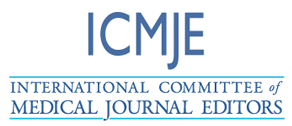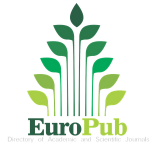Factors Related to Public Acceptance of the Covid 19 Vaccine
Keywords:
Vaccines, Covid-19, Knowledge, Attitudes, PerceptionsAbstract
Background: Background: Efforts in the prevention of Covid-19 are by conducting vaccination programs. However, the public response to Covid-19 vaccination is still very low. The low willingness of the public to vaccinate is the cause of the low achievement of the vaccination program.
Objectives: This study aims to find out the relationship of knowledge, attitudes, and perceptions of the public with the willingness of the Covid-19 vaccine.
Methods: The type of research used is quantitative with cross-sectional designs. The population of this study was a society of 19-59 years old. The sample was taken by 159 respondents. The instrument used is a questionnaire. The statistical test used is the chi-square test.
Results: The results showed that most of the public was not willing to be vaccinated (54.1%). Variables related to the willingness of the Covid-19 vaccine in the community are knowledge (p=0.000) and POR= 3.68 (1,864-7,274), attitude (p=0.000) and POR= 2.51 (1,302-4,852), and perception (p=0.000) and POR= 4.43 (2,273-8,637).
Conclusion: This study proves that the willingness of Covid-19 vaccination in the community is influenced by people's knowledge, attitudes, and perceptions. It is necessary to educate the public about the importance of Covid-19 vaccination in preventing the spread of Covid-19 cases.
References
I. Sutriyawan A, Akbar H, Fibrianti IP, Somantri UW, Sari LY. Descriptive Online Survey: Knowledge, Attitudes, and Anxiety During the Period of Pandemic COVID-19 in Indonesia. Med Leg Updat. 2021;21(1):42–8.
II. Harahap RJT. Karakteristik Klinis Penyakit Coronavirus 2019. J Penelit Perawat Prof. 2020;1:317–24.
III. Kementrian Kesehatan. No Title. Vaksinasi COVID-19 Nasional. 2021.
IV. Dinas Kesehatan Kabupaten Bandung. No Title. Pelaksanaa vaksin covid 19 di Kabupaten Bandung. 2021.
V. Safitri S. Edukasi Pencegahan Penularan Covid-19 pada Ibu Hamil di Kota Jambi. J Abdimas Kesehat. 2021;3(2):165–73.
VI. Devi Pramita Sari, Nabila Sholihah ‘Atiqoh. Hubungan Antara Pengetahuan Masyarakat Dengan Kepatuhan Penggunaan Masker Sebagai Upaya Pencegahan Penyakit Covid-19 Di Ngronggah. Infokes J Ilm Rekam Medis dan Inform Kesehat. 2020;10(1):52–5.
VII. Purnamasari I, Raharyani AE. Tingkat Pengetahuan Dan Perilaku Masyarakat Kabupaten Wonosobo Tentang Covid -19. J Ilm Kesehat [Internet]. 2020;3(1):33–42. Available from:
https://ojs.unsiq.ac.id/index.php/jik/article/view/1311
VIII. Abdelhafiz AS, Mohammed Z, Ibrahim ME, Ziady HH, Alorabi M, Ayyad M, et al. Knowledge, Perceptions, and Attitude of Egyptians Towards the Novel Coronavirus Disease (COVID-19). J Community Health. 2020;45(5):881–90.
IX. Lomboan. Gambaran Persepsi Masyarakat Tentang Pencegahan Covid-19 Di Kelurahan Talikuran Utara Kecamatan Kawangkoan Utara. Kesmas. 2020;9(4):111–7.
X. Sutriyawan A. Metodologi Penelitian Kedokteran dan Kesehatan: Dilengkapi Tuntunan Membuat Proposal Penelitian. Bandung: PT Refika Aditama; 2021.
XI. Prevention C for DC and. Possible Side Effects After Getting a COVID-19 Vaccine. 2021.
XII. Febriyanti N, Choliq MI, Mukti AW. Hubungan Tingkat Pengetahuan dan Kesediaan Vaksinasi Covid-19 pada Warga Kelurahan Dukuh Menanggal Kota Surabaya. SNHRP. 2021;3:36–42.
XIII. Tsai F-J, Yang H-W, Lin C-P, Liu JZ. Acceptability of covid-19 vaccines and protective behavior among adults in taiwan: Associations between risk perception and willingness to vaccinate against covid-19. Int J Environ Res Public Health. 2021;18(11):5579.
XIV. Sutriyawan A. Anxiety During the Covid-19 Pandemic in Indonesian Society. Int J Clin Sci Med Res. 2021;1(1):34–40.
XV. Lu J, Wen X, Guo Q, Ji M, Zhang F, Wagner AL, et al. Sensitivity to COVID-19 Vaccine Effectiveness and Safety in Shanghai, China. Vaccines. 2021;9(5):472.
XVI. Machida M, Nakamura I, Kojima T, Saito R, Nakaya T, Hanibuchi T, et al. Acceptance of a COVID-19 Vaccine in Japan during the COVID-19 Pandemic. Vaccines. 2021;9(3):210.
XVII. Jaramillo-Monge J, Obimpeh M, Vega B, Acurio D, Boven A, Verhoeven V, et al. COVID-19 Vaccine Acceptance in Azuay Province, Ecuador: A Cross-Sectional Online Survey. Vaccines. 2021;9(6):678.
XVIII. Widayanti LP, Kusumawati E. Hubungan Persepsi Tentang Efektifitas Vaksin Dengan Sikap Kesediaan Mengikuti Vaksinasi Covid-19. Hear J Kesehat Masy. 2021;9(2):78–85.
XIX. Tasnim T. Persepsi Masyarakat Tentang Vaksin Covid-19 Di Wilayah Provinsi Sulawesi Tenggara. Yayasan Kita Menulis; 2021.
XX. Astuti NP, Nugroho EGZ, Lattu JC, Potempu IR, Swandana DA. Persepsi Masyarakat terhadap Penerimaan Vaksinasi Covid-19: Literature Review. J Keperawatan. 2021;13(3):569–80.
XXI. Argista ZL, Sitorus RJ. Persepsi Masyarakat Terhadap Vaksin COVID-19 di Sumatera Selatan. Sriwijaya University; 2021.











